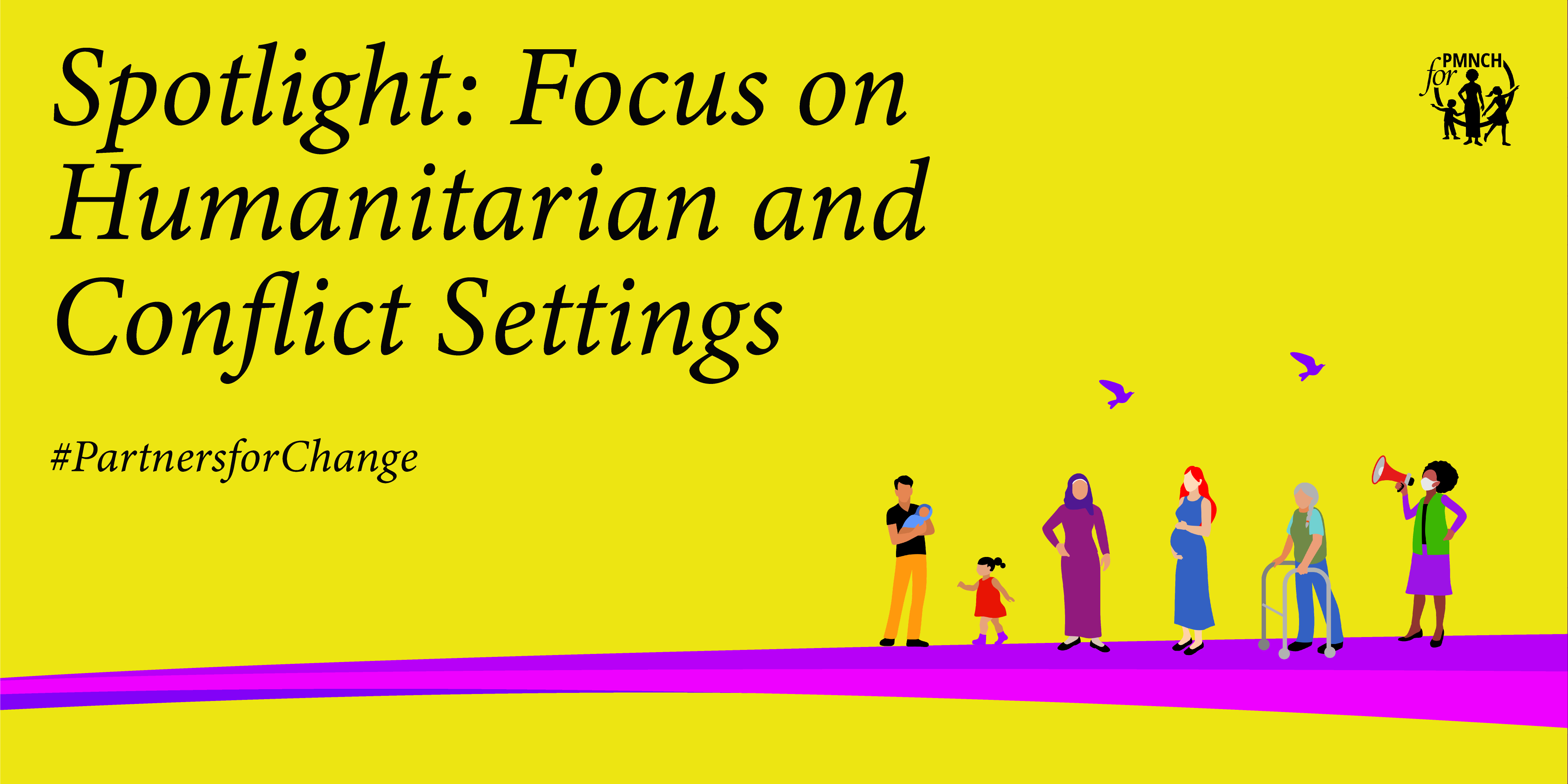
In conflict-affected contexts, with high levels of insecurity, population movement, disruptions in supply chains, and exacerbations of pre-existing shortages of human and financial resources, it is especially difficult to deliver services to affected populations. Of the 20 countries with the highest neonatal mortality rates, 19 are in conflict and approximately one-fifth of the world’s population of women and children are living in countries experiencing armed conflict.
During its previous five-year Strategy period (2016-2020), PMNCH developed an important programme of evidence and advocacy work to address the special requirements of providing sexual, reproductive, maternal, newborn, child, and adolescent health, and nutrition services in conflict settings. For instance, PMNCH supported the development and dissemination of the Roadmap to Accelerate Progress for Every Newborn in Humanitarian Settings 2020 – 2024. PMNCH also supported integrating a focus on humanitarian and fragile settings in the State of the World Midwifery 2021 report.
This work continues in the current Strategy period (2021-2025), and has included a wide range of comments, knowledge translation products and events with a view to foster multi-stakeholder partnerships and support access to and uptake of robust knowledge for evidence based advocacy for equity enhancing service delivery, policy and financing.
One of the most important collaborations for PMNCH in this period has been with BRANCH Consortium (Bridging Research & Action in Conflict Settings for the Health of Women & Children), an academic research enterprise comprised of leading academics from across the world, aiming to improve evidence and guidance for effective action on women’s and children’s health and nutrition in conflict settings. A foundational output from this work, for example, was the 2021 Lancet Series on Women’s and Children’s Health in Conflict Settings.
Watch the global launch of the Lancet Series on Women's and Children's Health in Conflict Settings
Knowledge Summaries and Policy Briefs on Women’s and Children’s Health in Conflict Settings
To amplify the findings from the Lancet Series and other BRANCH research, PMNCH also supported the BRANCH Consortium in the development of a number of knowledge translations products, including summary briefs and policy briefs. The aim of these knowledge translation products is to increase the uptake of these findings among a wide range of stakeholders, as well as offer several policy asks and recommendations to strengthen the delivery of health services to women, newborns, children, and adolescents in conflict settings.
Summary briefs
- The Current Landscape of the Epidemiology and Burden: English, French, Arabic
- The Current Evidence and Guidance Landscape for Identifying and Implementing Priority Interventions: English, French, Arabic
- Prioritizing and Packaging Health Interventions - Deciding What to Deliver, When and How: English, French, Arabic
- Barriers to and facilitators of effective service delivery: English, French, Arabic
- Women's and Children's Health in Conflict Settings: Key Messages and Next Steps: English, French, Arabic
Policy briefs
- Engaging and Empowering a Localized Innovative Health Workforce: English, French, Arabic
- Strategic, Adaptable, and Multi-sectoral Leadership, Governance and Coordination: English, French, Arabic
- Comprehensive, Sustainable and Needs-based Health Financing: English, French, Arabic
Regional Workshops to improve evidence and guidance for more effective health action for conflict affected women, children and adolescents
Additionally, to further enhance research and evidence, along with coordinated advocacy and action for improved WCH in conflict settings, in line with the findings from the BRANCH research and building on key aspects of the PMNCH COVID-19 Call to Action, the BRANCH Consortium and PMNCH collaborated with a number of local partners to organize a set of virtual regional workshops.
- On 10 August 2021, the BRANCH Consortium and PMNCH together with the Institute for Global Health and Development at the Aga Khan University, as the lead local host, held a regional multi-stakeholder virtual one-day workshop with a particular focus on Afghanistan and Pakistan.
- On 12-13 October 2021, the BRANCH Consortium and PMNCH together with the Knowledge to Policy (K2P) Center at the American University of Beirut, as the lead local organizer, held a regional multi-stakeholder virtual two-day workshop in the Eastern Mediterranean Region (EMR)
- On 30 November 2021, the BRANCH Consortium and PMNCH together with the University of Ibadan, as the lead local anchor organization, held a one day virtual workshop, with a particular focus on Nigeria and Mali
The over-arching intent of the workshops was to leverage recent evidence to advance multistakeholder policy dialogue and further an action-oriented research and evidence-based advocacy agenda to meet the needs of women, children and adolescents in conflict settings. The workshops thus brought together stakeholders with a view to strengthen dialogue amongst disparate stakeholder groups working on issues across the continuum of care for more responsive evidence-informed policy, financing and action for WCH in conflict affected contexts. For instance, the workshop in EMR brought together 50 stakeholders of different expertise from eight different EMR countries that include Lebanon, Jordan, Syria, Yemen, Afghanistan, Somalia, Egypt, and Pakistan. Participants were from governments, academic and research institutions, non-governmental organizations, adolescent and youth organizations, UN agencies, donor organizations, and health care professional associations.
Agenda, speaker bios and background information
- Workshop 1: A Regional Focus on Afghanistan and Pakistan
- Workshop 2: A Regional Focus on the Eastern Mediterranean
- Workshop 3: A Regional Focus on West Africa
Meeting reports detailing the discussions and resolutions from each workshop are currently being prepared and will be made publicly available in early 2022.

.png?sfvrsn=6d0e27cd_1)



